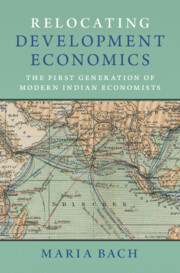Book contents
- Relocating Development Economics
- Historical Perspectives on Modern Economics
- Relocating Development Economics
- Copyright page
- Dedication
- Contents
- Figures
- Tables
- Acknowledgements
- 1 Introduction: Relocating Development Economics
- 1 The Context
- 2 The Beginnings of Indian Economics
- 3 Stages of Civilisation
- 4 Regress
- 5 Developing Balanced Growth at Home
- 6 A Global Win–Win Model for Development
- Epilogue: Multiple Definitions of Progress and Development
- References
- Annex I Archival Sources – Major Works of the First Generation of Modern Indian Economists, 1870–1905
- Index
- Other Books in the Series (continued from page ii)
6 - A Global Win–Win Model for Development
Published online by Cambridge University Press: 05 December 2024
- Relocating Development Economics
- Historical Perspectives on Modern Economics
- Relocating Development Economics
- Copyright page
- Dedication
- Contents
- Figures
- Tables
- Acknowledgements
- 1 Introduction: Relocating Development Economics
- 1 The Context
- 2 The Beginnings of Indian Economics
- 3 Stages of Civilisation
- 4 Regress
- 5 Developing Balanced Growth at Home
- 6 A Global Win–Win Model for Development
- Epilogue: Multiple Definitions of Progress and Development
- References
- Annex I Archival Sources – Major Works of the First Generation of Modern Indian Economists, 1870–1905
- Index
- Other Books in the Series (continued from page ii)
Summary
Indian Economics’ global development plan in the long run was universal industrialisation and free trade. The widely accepted plan for development in the nineteenth century was broadly based on David Ricardo’s comparative advantage model, which prescribed industrialisation for western Europe and condemned the rest of the world to producing raw materials. This international division of labour, argued Mahadev Govind Ranade, would not, like the model theorised, bring Indians the highest level of progress. Indian Economics envisaged a positive-sum game of global development where an industrialised Asia would not outcompete the already industrialised western Europe. Industrialisation in India would bring higher standards of living and increase global aggregate demand, leading people to buy more goods from Britain and other industrialised countries. Universal industrialisation would, argued the Indian economists, be win–win for the world economy.
Keywords
- Type
- Chapter
- Information
- Relocating Development EconomicsThe First Generation of Modern Indian Economists, pp. 130 - 150Publisher: Cambridge University PressPrint publication year: 2024

